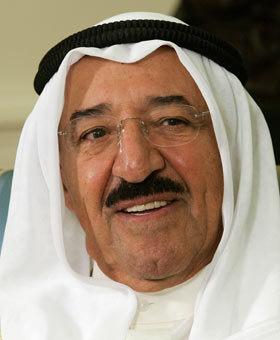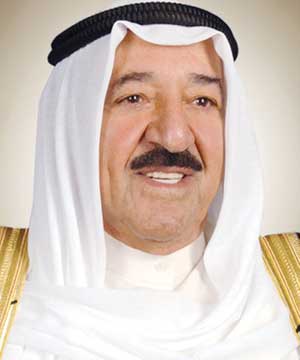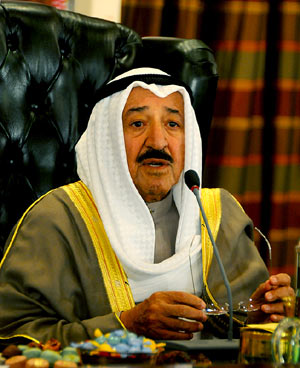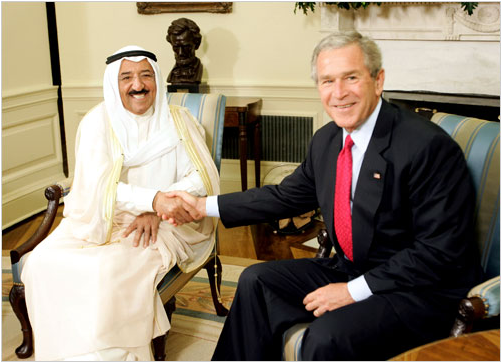<Back to Index>
- Emir of Kuwait Sabah IV Al-Ahmad Al-Jaber Al-Sabah, 1929
PAGE SPONSOR



Sheikh Sabah IV Al-Ahmad Al-Jaber Al-Sabah (Arabic: صباح الأحمد الجابر الصباح; born June 16, 1929) was the Emir of Kuwait. Sheikh Sabah was sworn in on January 29, 2006 after confirmation by the National Assembly of Kuwait. He was the fourth son of Emir Ahmad Al-Jaber Al-Sabah. Sheikh Sabah was the head of the ruling Al-Sabah family. He introduced many new projects in Kuwait to increase the tourism industry. He was also a strong advocate for women’s rights in the Middle East.
Sheikh Sabah received his primary education at Al Mubarakya School during the 1930s and then completed his education under tutors. He was the half brother of the previous Emir of Kuwait, H.H. Sheikh Jaber III al-Ahmad al-Jaber al-Sabah, who appointed Sabah as Prime Minister in July 2003, replacing the then Crown Prince of Kuwait, H.H. Sheikh Saad Al-Abdullah Al-Salim Al-Sabah. He had previously been Foreign Minister for 40 years, from 1963 to 2003, making him one of the longest serving foreign ministers in the world.
Sheikh Sabah's wife, Sheikha Fitooh, died before the Iraqi invasion of August 1990. He had two sons, Sheikh Nasser (Minister of the Ruler's Court "Diwan Amiri"), and Sheikh Hamed. Sheikh Sabah also had two other children who died. His daughter, Sheikha Salwa, died from breast cancer in July 2002. In her honor, the Emir named his palace "Dar Salwa", which means "The House of Salwa". His third son, Sheikh Ahmed, died in a car accident in 1969.
On 15 January 2006 the then Emir, Sheikh Jaber, died, which placed Sheikh Saad, who was then the Crown Prince of Kuwait, into the position of Emir. With the accession of Sheikh Saad, Sabah was likely to become the new Crown Prince, retaining his function of Prime Minister. However, the Constitution requires that the Emir be sworn in before Parliament, and the oath of office is complex; soon the word began to spread that Sheikh Saad was unable to take the oath in full. Some reports suggested that he suffered from Alzheimers or some other debilitating disease; it was generally agreed that he was unable to speak, at least at any length. However, after a power struggle within the ruling family, Sheikh Saad agreed to abdicate as the Emir of Kuwait on 23 January 2006 due to his illness. The ruling family then chose Sheikh Sabah as the new Emir of Kuwait. On January 24, 2006, Kuwait’s parliament voted Emir Saad out of office, moments before an official letter of abdication was received. The Kuwaiti Cabinet nominated Sheikh Sabah to take over as emir. He swore himself in on January 29, 2006 with the National Assembly's approval, ending that crisis.
Sheikh Sabah dissolved the National Assembly of Kuwait
on March 19, 2008 and called for early elections on May 17, 2008, after
the cabinet resigned in the week of March 17, 2008 following a power
struggle with the government.
- Repeal of law against public gatherings.
- A law increasing the amount of licenses available for privately held newspapers and television stations.
- An increase of his stipend from 8 million KD (approximately $25 million) to 50 million KD (approximately $188 million) annually.
- A new media law that is one of the strongest press freedom laws in the Arab world.
- Member of the Central Committee Municipality Council from 1954 to 1955.
- Member of the Building and Construction council.
- Chairman of the Social Affairs and Labor Authority in 1955.
- Member of the Higher Council of Country Affairs in 1956.
- Chairman of the Printing and Publishing Authority from 1956 - 09 - 09 to 1962 - 01 - 17.
- Minister of Information - in the first cabinet that took power after independence in the period of Sheikh Abdullah Salim Al-Sabah, on January 17, 1962.
- Foreign Minister since 28 January 1963.
- Deputy Prime Minister on February 16, 1978 in addition to his post of Foreign Minister.
- First Deputy Prime Minister and Foreign Minister on October 18, 1992.
- Member of the Supreme Council of Planning in 1996, headed by the Crown Prince Sheikh Saad Al-Abdullah Al-Salim Al-Sabah.
- Chairman of the Cabinet's Joint Ministerial Committee on Priorities of Governmental Work.
- Prime Minister from July 13, 2003 to January 29, 2006.
- Honorary Trustee of the Metropolitan Museum of Art in New York
